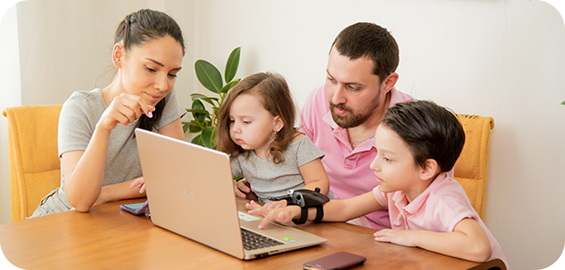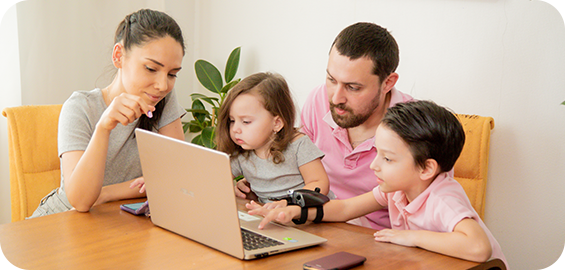Online Safety Parent Guide
Free Online Courses
Goal:
The internet is one of our greatest tools for learning and connecting with others. This course will teach the 5 easy steps that will help your child thrive and explore the online world in a safe manner.
- Awareness
- Discussion
- Defense
- Monitoring
- Learn and repeat
![]()
Awareness:
Perhaps the most important aspect of online safety is being aware of the possible dangers. As a parent it’s your responsibility to know what environments your children are in. All of us help and teach our children to cross the street in real life, because we are aware of the danger that a car could hit our kids. Similarly if we become aware of the possible dangers, it’s much easier to keep your kids safe while they grow and thrive.
Here is a list of the most common danger examples in the online world:
-Websites, links, and other online technologies that seek to install viruses on your computer
-Strangers that seek personal information to scam your family
-Strangers that seek to meet in real life
-Strangers that lie and make up stories in order for your family to send them money
-Strangers that seek to gain your passwords
Solutions
–Keep passwords safe
-Change passwords to make them stronger
-Don’t share valuable personal information with strangers (address, social security, date of birth etc..)
-Install antivirus software
-Don’t meet with strangers in real life
-Don’t send money to strangers
-If someone you know is asking for personal information or money over the internet, give them a call to make sure it’s really them
-Avoid websites that look suspicious and that ask you for unnecessary information



Discussion:
Once you become aware of those dangers, it’s important that you discuss them and explain them to your kids, in the same manner in which we are able to explain why we should look both ways when crossing the street. Explain the dangers and the solutions. The younger your children are, the simpler you must explain it to them. Keep in mind that most parents only discuss online safety for a few minutes with their children over their entire lifetime. So becoming involved even just a little will go a long way.
Pro tip: Playout scenarios with your children to explain how they should respond to the dangers
![]()
Defense:
Add antivirus software to your electronic devices, and activate parental blocks that your devices and apps offer. An example of this is turning on child safe search in the settings section of your apps that connect to the internet.
![]()
Monitoring:
Ok so you’ve become informed about the dangers, you’ve discussed them with your child and you’ve set up defensive mechanisms to keep your family safe. The next step is constant monitoring. It’s your responsibility as a parent to know what new apps your kids are using and what are the user capabilities.
This can be the hardest step for some people, fue to the fact that they might feel out of touch with technology. But with a quick google search you can become very well informed about any app in a couple of minutes.
Also, as your children grow, start giving them more freedom so that they can continue exploring and thriving.
Trust: When monitoring our children we should always keep trust in mind. The easiest way to do this is telling your children how and what you’ll be doing to keep them safe. Some parents disregard this in order to avoid conflict but if you follow the discussion step with your children, you’ll face little or no friction.



![]()
Learn and repeat:
Once you get to this step you will feel like an online safety pro. The only thing left for you to do will be to keep an eye out for new apps, devices, and technologies. Once you do that, repeat all the previous steps whenever necessary. Additionally we recommend that you seek new educational online safety resources so that you can continue learning and protecting.
How often should I discuss online safety with my children?
Should I tell my children I’m monitoring their online activity and how?
What should I do if my child wants to use a new app that I don’t know about?
What topics should I discuss with my children?
What technology defense tools should I use?

LICENSING AND LEGAL REGULATIONS
Hokku Education, LLC complies with the Texas education code 51.9241 State regulations of Private Schools.
